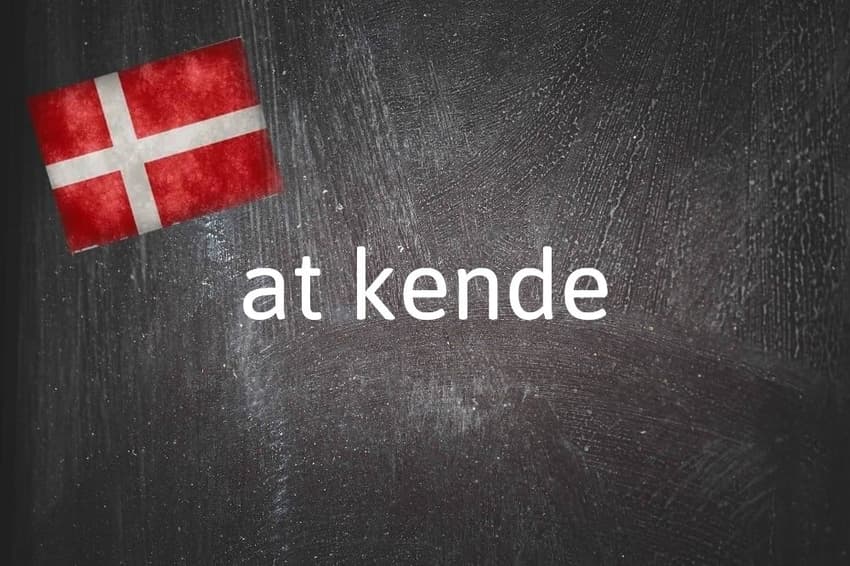Danish word of the day: at kende

Photo by Francesco Ungaro on Unsplash and Nicolas Raymond/FlickR
Today’s Danish word of the day is definitely worth knowing.
What is at kende?
At kende is a verb (the “at” denotes it is in the infinitive form) and translates to “to know”. However, it’s not a straightforward like-for-like with the English word.
To understand this, we need to also look at the other Danish verb which translates to “to know”, at vide.
You can think of the difference between the two as being related to a knowledge or acquaintance with a person of thing (at kende), and knowing a factual relation (at vide).
So, for example, you might say jeg kender godt Christian (I know Christian well), but use vide [ved in present tense] if you know who Christian is but haven’t met him: jeg ved godt, hvem Christian er, men jeg kender ham ikke.
Another way of thinking about this is being familiar with something to the extent that you could do it, or a more direct and first-hand knowledge. You might say jeg kender godt opskriften til muffins (“I know the recipe for muffins”) or jeg ved godt, hvordan man laver muffins (“I know how to make muffins”).
Additionally, at kende can also mean to recognise a concept or feeling (jeg kender godt følelsen means “I know the feeling”). If you recognise a person or object, though, the correct word is genkende, as in jeg kunne godt genkende Christian fra billedet (“I recognised Christian from the photo”).
Why do I need to know at kende?
Many words in the Scots language are derived, like Danish, from Old Norse.
In turn, some of these Scots words have found their way into Scottish dialects of English, and you may have therefore heard them many times in Scots or English before you came across them in Danish.
At kende is one such example of this, with “ken” very commonly used instead of the word “know” in Scottish dialects of English.
Other examples of words like this include “bairn” for child (Danish: barn), “kirk” for church (Danish: kirke), “efter” for after (Danish: efter), “flittin’” when talking about moving house (to move in Danish is at flytte), “hoose” for house (Danish: hus), and possibly “greetin” for crying (Danish: græder).
Scots also has the word braw meaning “good” or “excellent” which, although not used in Danish, will be very familiar to Swedish or Norwegian speakers who say bra for the exact same reason.
There are probably many more words like this which someone who is Scottish or a native speaker of Scots, or an expert in Old Norse languages, would be able to identify.
Comments
See Also
What is at kende?
At kende is a verb (the “at” denotes it is in the infinitive form) and translates to “to know”. However, it’s not a straightforward like-for-like with the English word.
To understand this, we need to also look at the other Danish verb which translates to “to know”, at vide.
You can think of the difference between the two as being related to a knowledge or acquaintance with a person of thing (at kende), and knowing a factual relation (at vide).
So, for example, you might say jeg kender godt Christian (I know Christian well), but use vide [ved in present tense] if you know who Christian is but haven’t met him: jeg ved godt, hvem Christian er, men jeg kender ham ikke.
Another way of thinking about this is being familiar with something to the extent that you could do it, or a more direct and first-hand knowledge. You might say jeg kender godt opskriften til muffins (“I know the recipe for muffins”) or jeg ved godt, hvordan man laver muffins (“I know how to make muffins”).
Additionally, at kende can also mean to recognise a concept or feeling (jeg kender godt følelsen means “I know the feeling”). If you recognise a person or object, though, the correct word is genkende, as in jeg kunne godt genkende Christian fra billedet (“I recognised Christian from the photo”).
Why do I need to know at kende?
Many words in the Scots language are derived, like Danish, from Old Norse.
In turn, some of these Scots words have found their way into Scottish dialects of English, and you may have therefore heard them many times in Scots or English before you came across them in Danish.
At kende is one such example of this, with “ken” very commonly used instead of the word “know” in Scottish dialects of English.
Other examples of words like this include “bairn” for child (Danish: barn), “kirk” for church (Danish: kirke), “efter” for after (Danish: efter), “flittin’” when talking about moving house (to move in Danish is at flytte), “hoose” for house (Danish: hus), and possibly “greetin” for crying (Danish: græder).
Scots also has the word braw meaning “good” or “excellent” which, although not used in Danish, will be very familiar to Swedish or Norwegian speakers who say bra for the exact same reason.
There are probably many more words like this which someone who is Scottish or a native speaker of Scots, or an expert in Old Norse languages, would be able to identify.
Join the conversation in our comments section below. Share your own views and experience and if you have a question or suggestion for our journalists then email us at [email protected].
Please keep comments civil, constructive and on topic – and make sure to read our terms of use before getting involved.
Please log in here to leave a comment.